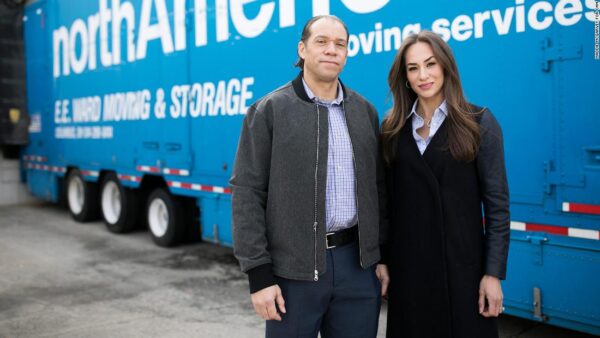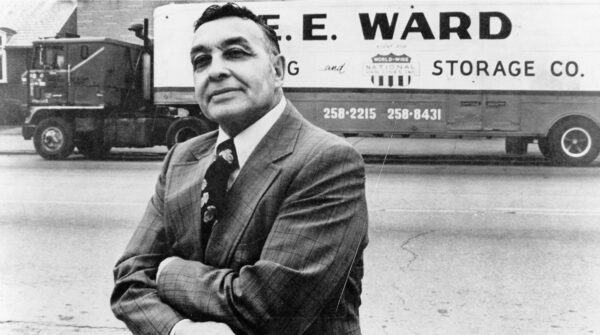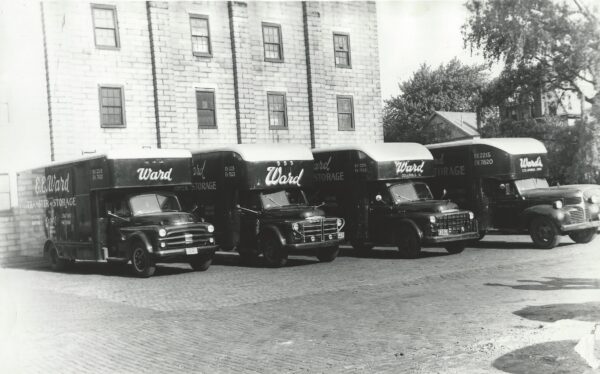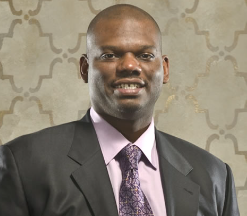E.E. Ward Moving & Storage Co. is not your run-of-the-mill moving company. John T. Ward founded it in 1881, in Columbus, Ohio, making it now the oldest Black-owned business in the nation. But Ward was more than an entrepreneur; he was a conductor on the Underground Railroad first. He transported enslaved people from one depot to the next using two horses and a wagon.

After slavery was abolished, he turned his means of transportation into a moving company and later passed it on to his son, William Ward. Then William’s son, Edgar Earl Ward, began running the firm in 1899. Later Eldon, Ward, William’s grandson, joined the family business in 1945, making him the last Ward family member to own the company. Eldon didn’t have any children to carry on the succession, but Brian Brooks, a Black entrepreneur, took over as co-owner of the company. Brian’s father was E.E. Ward’s attorney for 20 years and their families were so close Eldon Earl Ward was Brian’s godfather.
Determined to keep the business alive, Brian bought the firm from Eldon with his business partner in April 2001. When his associate left the company in 2014, Dominique, Brian’s wife, replaced him. She manages the firm’s branding and marketing.

Before E.E. Ward, Brian had little experience with the moving industry, but he had an MBA from Franklin University and experience planning his family’s real estate business.
E.E. Ward truly stood the test of time. The company survived the Jim Crow South, the Reconstruction era, the civil rights movement, and a pandemic. E.E. Ward has moved like an unstoppable train for the past 140 years, and thanks to new owners Brian and Dominique Brooks, that engine is still going.
They’ve come out on the other side of 2020, a financially tumultuous year for many businesses. And yet they still have plenty on the horizon, like a children’s book about the founder and more apparel that celebrates the company’s legacy. But running a firm like E.E. Ward requires skills and perseverance, which this co-owning couple has honed and developed.
Here are a few tips they’ve used to keep this representation of Black excellence thriving.
Ask Yourself What Is Your Business About?
Together, the Brookses have turned a company that started with just five workers into a booming business with more than 75 employees across three locations, including Columbus, Ohio, and Charlotte and Raleigh in North Carolina. They did this by taking the time to learn who they were as a company.
“We had to identify who we were as a business,” Brian told Finurah. “Once you decide this and who you want to be, you have to find the people that fit that.”
Understanding what they wanted they wanted their business to represent and operate allowed them to move confidently in the direction they wanted.

Find Customers That Fit Your Business Just as Much as You Fit Them
Growing your consumer base is business 101, but Brian and Dominique learned that there is value in working with customers who respect your organization just as much as you do. Expanding your reach as a business is key to growth, but the clientele you invest in is just as crucial to your company’s trajectory.
“Sometimes [business owners] are so busy being interested in getting someone to hire you,” Brian says. “You can go get business, but are these customers going to help you grow? There are all kinds of customers out there, and that’s what you really have to understand.”
Business Is a Marathon, so Take Your Time
Dominique and Brian both begrudgingly admit they probably could have grown E.E. Ward much faster.
“But at what cost?” Brian explained. “When you grow, you have to be prepared, and you have to ask yourself, am I going to compromise something?”
Growth is always the mission, but the Brookses were also committed to maintaining their business, which they weren’t about to sacrifice for rapid expansion. The time they took allowed them to develop their business and hire the right people who believed in their company’s culture, Dominique explained.
Meet Your Employees Where They’re At
The year 2020 was rough on everyone, even for long-standing companies like E.E. Ward. The strife mentally affected many of their employees that year, from COVID-19 to the heavy racial unrest across the country.
“There was a lot of hidden pain in people because of what happened,” Brian says. “It impacted their mindset, so we just had to maintain an awareness and level of sensitivity toward what they might be experiencing or what might be affecting them outside of the nine to five.”
Don’t Be Afraid to Begin
It’s important to remember that E.E. Ward wasn’t the only minority business that set out to make its mark. There were “many other Black businesses out there that said, ‘You know what, I see that there’s an opportunity, and I’m gonna start,’” Dominique says. “And as we know, there is power in the start. What John T. Ward did matters today. So if we continue to inspire the next generation to keep going, we can all look back and say hey, so what can we do with what we have in front of us?”
If there’s anything the Wards has taught the Brookses, it’s that the decisions you make for your company today that impacts its legacy and future.
Be Vulnerable and Share Your Story
When people identify with your business story, they’re more apt to participate in it, not just for your offerings but also for your narrative.
“(E.E Ward) has been through the Civil War, the Great Depression, two world wars, the Great Recession, and 27 presidential terms, and never closed its doors,” Dominique says. “That’s an incredible story, and I think people can sit there and say, ‘Hmm, I can draw inspiration from that.’”
Just as there is power in a good business strategy, your story also matter to your consumers. So take the time to think about what truly inspires your start and why your business is important. It’s more than a branding tactic but “the best way to connect with your community and find a sense of community,” Dominique says.
“If Ward Can, I Can”
It’s safe to say many people can draw inspiration from the story of E.E. Ward. John T. Ward successfully led his business despite working during Jim Crow and with nothing more than two horses and a wagon.
“And here we are 140 years later,” Dominique says. “We’re in a modern era, an era of technology, access. We have way more opportunity than folks did in 1881.”
Ward’s story is one of phenomenal entrepreneurship, Dominique explains.
“We all can draw inspiration from [Ward’s] legacy of perseverance,” she says.




